June features numerous anniversaries and a special day to mark reconciliation, justice and rights, and the culture of Indigenous peoples. At KAIROS, we will raise up and celebrate the important work of Indigenous women, all month long.
Blog: June is Indigenous Women’s Month at KAIROS
Blog: Ravens: Messengers of Change takes flight to foster Reconciliation
Profiles
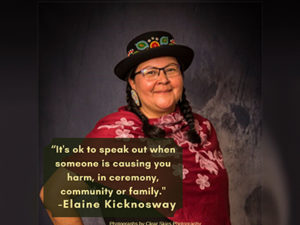
Elaine Kicknosway
Topic: Indigenous Spirituality
Background:
Elaine is an Appointed Designated Minister, a resident of Ottawa, and proud to be Swampy Cree through her biological mother and Chippewa from her biological father’s side. Elaine is a mother of one, a stepmother, a singer, and believes in love, life and ceremony. She has been conducting personalized wedding ceremonies since 2015. Elaine’s career has included work with the Odawa Native Friendship Centre as a pre-and post-natal worker and nutrition coordinator. There, she facilitated an aboriginal pre-natal community kitchen and promoted Oska Wasis: a new infant development program for Aboriginal families. She has also been a child advocate at Oski Kizis Lodge – Women’s Shelter and acted as Head Teacher at Tungasuvvingat Inuit Headstart. Elaine is a proud practitioner of tradition. She is an Indigenous doula, a dancer, singer and drummer. She performs seasonal and moon ceremonies and participates in other cultural and traditional arts such as beading, drum making, rattle making and crafts. She is the only indigenous wedding officiant in the eastern Ontario region and a seasoned KAIROS Blanket Exercise facilitator and trainer.Heartwork:
Elaine graduated from the Early Childhood Education program at Algonquin College in 1989 and since then has built a 25-year career of dedicated community service. She has shown consistent involvement and leadership with not-for-profit indigenous organizations, including the National Indigenous Survivors of Child Welfare Network, the Minwaashin Lodge Indigenous Women’s Support Centre, and the Children’s Aid Society of Ottawa.Indigenous Women:
Elaine has taken her incredible experience and learning as a member of the Indigenous community and applied it to change the lives of others. As a survivor of the 60s Scoop, which saw her removed from her family at the age of two-and-a-half, Elaine is an active member of discussions on the impacts of residential schools and child welfare. After overcoming her own addictions in youth, she is also a strong advocate of addiction and intergenerational awareness and parenting programs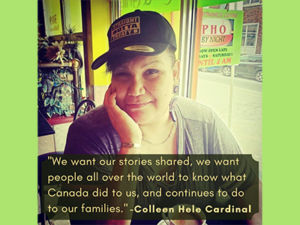
Colleen Cardinal Hele
Topic: Child Welfare and MMIWG Survivorship
Background:
Colleen Hele- Cardinal is co-founder and Executive Director of the National Indigenous Survivors of Child Welfare Network. She is nehiyaw iskwew from Saddle Lake First Nation, Alberta but adopted and raised in Sault Ste Marie, Ontario. She is the author of Ohpikiihaakan-ohpihmeh (Raised somewhere else): A 60s Scoop Adoptee’s Story of Coming Home, which was released through Rosewood Press. Colleen received the Ontario Premier’s Award in November 2018 for Outstanding Community work in her field and the 2019 CBC Trail Blazer award. Recently, she helped spearhead an innovative GIS mapping project Mapping the Indigenous Adoptee Disapora with the Pe-kīwēwin Project with Amnesty International.
Heartwork:
Colleen has successfully organized four national gatherings for 60s scoop survivors while giving context on the making of Canada, treaty relationships and the dehumanization of Indigenous people through policy, media and public speaking engagements. “Most importantly,” Colleen shares, “I’m the proud mother of four grown children and I love spending my free time with my granddaughters.”
Indigenous Women:
Colleen continues her involvement with several initiatives, including Families of Sisters in Spirit and the Nobel Women’s Initiative Sister to Sister Mentorship program to address gender-based violence, using her skills as a public speaker and candidly sharing stories as a family member of murdered and missing Indigenous women and the impacts of the 60s Scoop. Colleen works tirelessly to draw critical connections between genocidal colonial child welfare removal policies and her lived experiences and those of women in her family. “I’ll continue to raise the issue of the 60s scoop as well as build community support for 60s scoop survivors and bring international attention to the displacement and loss of identity 60s scoop survivors have experienced.”
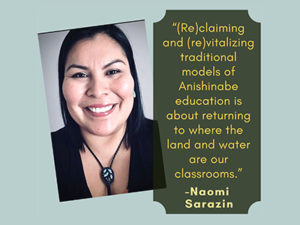
Naomi Sarazin
Topic: Empowering Youth through Land-Based Learning
Background:
Naomi is Anishinabekwe from Algonquins of Pikwàkanagàn First Nation. She is rooted in her homeland and has a deep love for aki and nibi (the land and water) that surround her. She has worked in the field of Indigenous education for more than 10 years and is enrolled in the Master of Professional Education program at the University of Western Ontario. Her research focuses on (re)claiming and (re)vitalizing traditional models of Anishinabe education, where the land and waters are our classrooms. Her passion for engaging and empowering youth to become the next generation of leaders, and stewards of the land and water, has led her to her current position at Ottawa Riverkeeper. At Ottawa Riverkeeper, she is the Senior Manager of Youth and Education Programs, coordinating the Youth Water Leaders Program and conducting a feasibility study to determine what it will take to launch a River School in Ottawa.
Heartwork:
In 2018, Naomi came across an online ad that was selling her grandfather Daniel Sarazin’s birchbark canoe. It was handcrafted in 1970, and two generations later it presented itself to Naomi. Since then she has embraced what she calls her tcîmân (canoe) journey. She repatriated the wìgwàs tcîmân (birchbark canoe) and is coordinating a coming home ceremony with her family and community. It’s a journey that is deeply rooted in love and learning. Love for her family, community, and the land where she is from. Learning, forever learning, Anishinabe gikendaasowin (knowledge) and izhitwaawin (culture, traditions, and practices). As she journeys around Anishinabeg territory she asks herself: what can I do to ensure my (unborn) children and grandchild have access to Anishinabe gikendaasowin and izhitwaawin? How can I center that learning – on the land, from the land, and with the land? Her heartwork is deeply connected to answering these questions in pursuit of developing and creating land-based learning opportunities for young people. It’s for continuance, and the generations to come.
Indigenous Women:
Anishinabekwe share a sacred connection to the spirit of water through their role as life givers and carry out the responsibilities to protect and nurture water for current and future generations. Since Naomi was an ikwezins (young girl), she learned about her role as Anishinabekwe – to be a caretaker of the water. Through both her work and research, she finds creative ways to engage, empower, and support youth in embracing the responsibility of being good stewards of the land and waters. She humbly embraces her Anishinabe teachings of spirit, family, and community as sources of strength and inspiration as she continues her tcîmân journey of creating land-based learning opportunities.
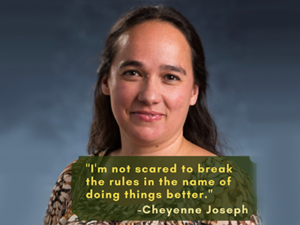
Cheyenne Joseph
Topic: A Healthy Canada, without racism
Background:
Cheyenne Joseph is a member of the Mi’kmaq Nation in Wabanaki territory. She has over 15 years of experience as a Registered Nurse, certified in Community Health Nursing, and has worked almost exclusively with Indigenous communities in Atlantic Canada. For the past seven years, she has been a faculty member at the University of New Brunswick (UNB), helping to strengthen the nursing curriculum by embedding Indigenous wisdom and knowledge.
Now, Cheyenne works as Executive Director of an alcohol & drug rehabilitation centre that serves 11 First Nation communities in New Brunswick. The programs and services are deeply rooted in Mi’kmaq culture. “This work is about getting at the root of how we collectively got here, it’s about bringing them back to their cultural identity-whether reclaiming or finding it for the first time.”
Heartwork:
Deeply connected to her Mi’kmaq heritage through Elders, ceremonies and cultural events, Cheyenne has been curating a better future for the next seven generations as a matriarch and community leader, staying true to her ancestral path. This is most evident in her private time as the Mi’kmaq Mama where she embraces opportunities to be a positive and influential voice for family wellness and culture. It is her grassroots approach to wellness that truly make Cheyenne’s contributions to the KAIROS Blanket Exercise team invaluable, particularly for raising up reconciliation work in the Maritimes.
Indigenous Women:
For Cheyenne, restoring balance in all areas is part of the work that remains. The 2014 Shale Fracking protest saw the divides between Elsipogtog First Nation, a Mi’kmaq community, and surrounding anglophone and francophone communities lessen and unite on the front of land defense.
“For a while we were feeling like we were coming together,” recalls Cheyenne. “Then a car accident happened that cost the life of a young Indigenous man and the alleged driver was a local francophone resident who recently was acquitted on the charges.”
The microaggressions were first to return to interactions between the communities. “We have a weird Canadian way of being racist, it’s so subtle that the general public can’t spot it but it’s everywhere.” The teachings around racism have permeated Cheyenne’s work in health care and in educating nursing students preparing to work with Indigenous patients. “There needs to be more of a balance between knowing that Indigenous women are at risk, celebrating our cultural identities and respecting the knowledge we do carry.”
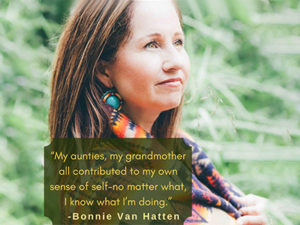
Bonnie Van Hatten
Topic: Empowering Matriarchs
Background:
Bonnie’s specific matrilineal ancestry is Secwepemc from St’uxwtews First Nation, located in what is now known as the Interior of BC. She has worked in Indigenous Education for the past 13 years. Bonnie holds MEd in Curriculum and Instruction at Simon Fraser University. Her research was focused on creating curriculum focused and centered on Indigenous ways of knowing. In addition, she holds an Indigenous Cultural Safety Facilitator Certificate from UBC Health. Her work includes Indigenizing and decolonizing curriculum for government and universities.
Heartwork:
Facilitating reconciliation dialogue with a strong emphasis on shared history, stereotypes/biases, responsible ally-ship & advocacy for direct calls to action within her company Skelep Reconciliation is the core of Bonnie’s heartwork. She cares about creating space to share ideas and voices, embodying the resilience of Indigenous women.
Indigenous Women:
Bonnie’s matriarchal foundation is rooted in mentorship, her career, identity and culture is connected through her to the land and her family. “My aunties, my grandmother all contributed to my own sense of self-no matter what, I know what I’m doing.”
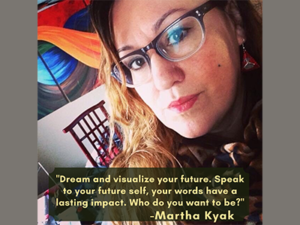
Martha Kyak
Topic: Artistic Empowerment
Background:
Martha Kyak is a fashion designer and artist originally from Mittimatalik (Pond Inlet), NU. She is the youngest of eleven children and most of her family members are creative, artistic, and in the field of education. A graduate of McGill University, she is a dedicated educator who has held meaningful positions including teacher, principal and superintendent. Martha is currently an instructor at the Ottawa based college program Nunavut Sivuniksavut where she teaches Inuit History, Inuktitut, and sewing.
Martha is a self-taught artist and seamstress working from Ottawa, Ontario. Living in Pond Inlet, Martha had her own retail store selling sewing supplies and other items. Her passion has always been sewing and designing as she grew up watching her mother and sisters sew. As an artist, she continues to transcend mediums as a multi-talented illustrator of several children’s books, accomplished painter, graphic designer and producer of Inuktitut books and teaching resources. She continues to evolve her creativity in fabric and fashion design.
Heartwork:
Martha’s fashion line InukChic has been prominently featured at Indigenous Fashion Week in Toronto and includes garments, jewelry and paintings. True to her arctic roots, sealskin is featured predominantly in her clothing and accessories. Her own fabric designs prominently feature ulus and arctic flowers. Kyak has exhibited and sold her work across the country including several runaway presentations.
Indigenous Women:
Martha creates art from traditional Inuit designs and includes contemporary influences, drawing heavily from her own appreciation for family, community and care. Her work continues to inspire others in the Indigenous fashion and business industries, educators and community builders alike, as she embodies the capability and style aspired to by many Indigenous professionals working to empower others.
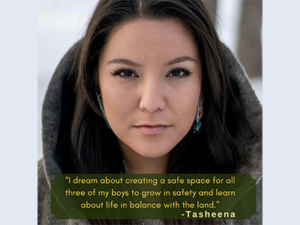
Tasheena
Topic: Rights for Indigenous families
Background:
A member of the Algonquins of Pikwàkanagàn First Nation, Tasheena has grown up in and around the urban and rural spaces of North Bay, Ontario. Growing up with connections to the land has meant different things at different times of her life. As a youth living and working on the powwow trail, she grew up with powwow family and ceremony, the value of teachings and her own Indigeneity and connections to Anishinaabek territory firmly grasped.
As an adult juggling career and parenthood, like many other Black, Indigenous, women of colour, Tasheena continues to be challenged by secure housing that meets the special needs of her family. A family-centered approach is the key to her success. “I’m truly fortunate to have my brother live in and help. I think of the people without family support and resources to access what is needed for their special need’s child from Jordan’s Principle. It’s gotten a lot worse since the pandemic started.”
Despite these challenges, Tasheena continues to work hard towards what her family needs most. A mortgage and a home to call their own. “I dream about creating a safe space for all three of my boys to grow in safety and learn about life in balance with the land.”
Heartwork:
Tasheena is a Cultural Educator, renowned singer and hand drummer who has dedicated countless years to teaching youth in Indigenous communities about using their voices and reclaiming their culture with pride. Recently, this took on a new meaning when she travelled to perform in a remote First Nations community and returned with e-coli and mercury poisoning, a direct result of her stay in the community.
Indigenous Women:
While her career as a multi-faceted entertainer continues to flourish and grow, Tasheena is devoted to a far less glamourous cause-pursuing the care and resources needed to support her middle son who lives with autism. Continuously and directly impacted by Jordan’s Principle, she remains vigilant and committed to providing each of her boys with what they need to realize health, happiness and success on their paths-a call many Indigenous women can identify with.
